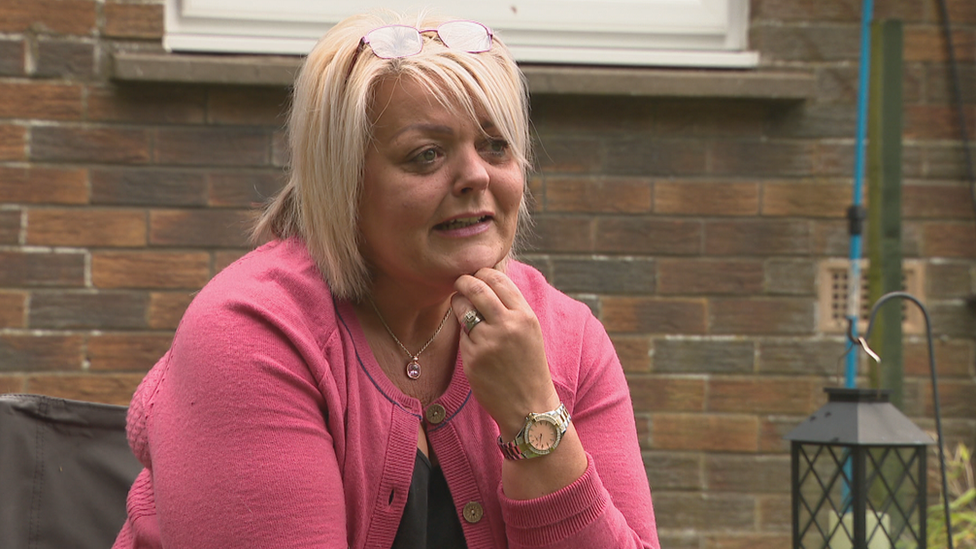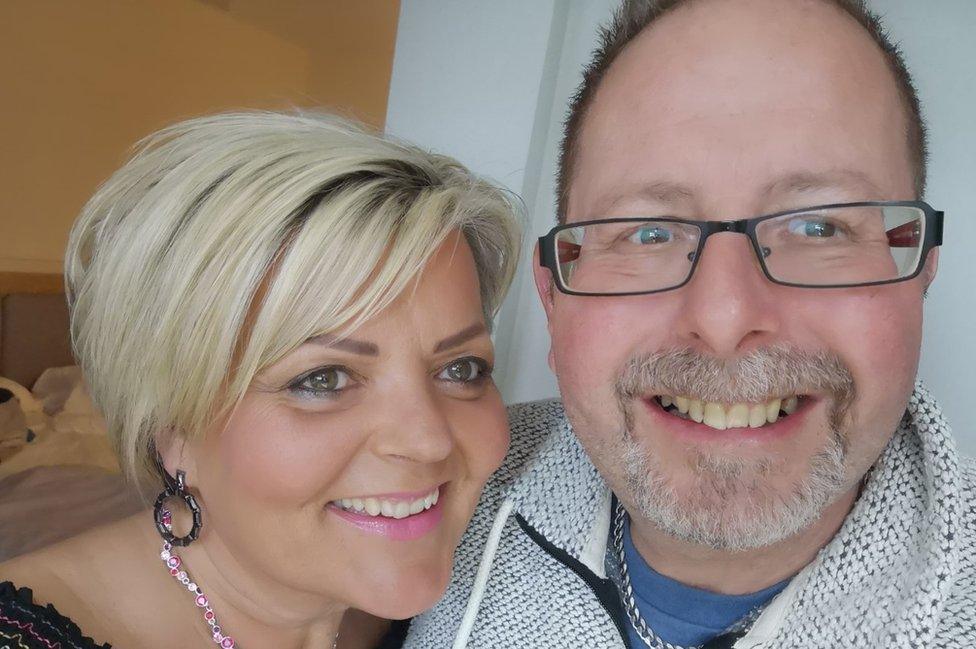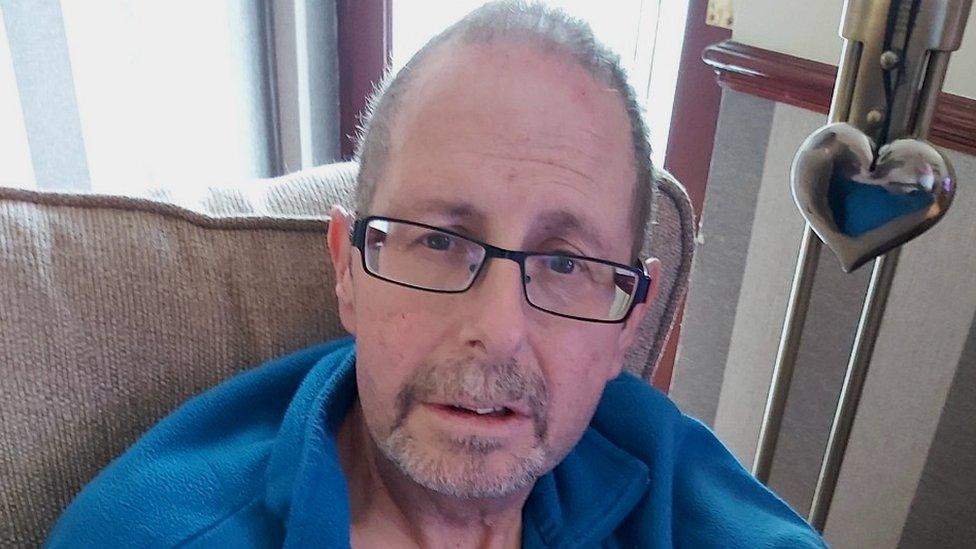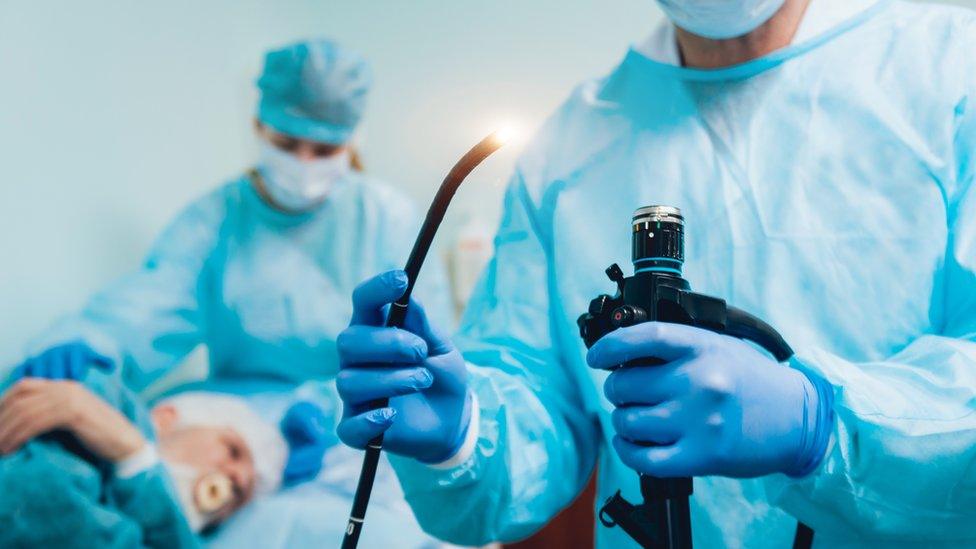Coronavirus endoscopy delay: 'My husband should still be here'
- Published
- comments

Sharon Hughes told BBC Scotland: "My world is never going to be the same again"
The widow of a cancer patient who died three days after getting the results of a delayed endoscopy believes his life could have been extended.
Billy Hughes was waiting for the procedure in Hairmyres hospital, East Kilbride, on 2 April when it was cancelled and he was sent home.
But his condition deteriorated and, a month later, his case was finally classed as an emergency.
Wife Sharon was not allowed to be with him when he got the results on 13 May.
Visiting had been suspended due to the Covid-19 lockdown, but about an hour later she was permitted to see him.
Mrs Hughes told BBC Reporting Scotland: "He was just a broken man. He died two days later. He never even got his original three or four months."
She believes the Scottish government and health board bosses "panicked" as the NHS prepared for the coronavirus pandemic.
The Scottish government has now announced endoscopy services will be restarted on the NHS.
But for many, the move has come too late.

Mr Hughes was first taken into hospital on 24 March which was the couple's wedding anniversary and Mrs Hughes' birthday
BBC Scotland first told Mr Hughes' story on 23 April, three days after it emerged there had a been a 72% reduction in urgent suspected cancer referrals by doctors.
He had been feeling ill since January and was admitted to hospital on 24 March where a scan later picked up "abnormalities" in his stomach.
But his scheduled endoscopy, which involves the insertion of a tube directly into the body to allow doctors to observe an internal organ or tissue in detail, was cancelled and he was sent home.
In the weeks that followed, Mrs Hughes said she called the hospital "begging" from them to do the procedure.
But she said she was warned about coming in due to the virus and had to settle for his painkillers being strengthened.
'Wilting'
Mrs Hughes, who met her husband when she was 14 and was with him for 38 years, added: "He was just wilting before my eyes."
On 26 April, Mr Hughes was readmitted to Hairmyres with blood clots on his lungs and had a scan the following morning.
Mrs Hughes recalled: "The consultant phoned me that afternoon to say that the scan hadn't changed much but he has terminal cancer.
"He would only have three or four months, possibly, to live but with palliative chemo they could maybe buy him another three or four months."
Mrs Hughes was then allowed a compassionate visit so she could discuss with her husband if they wanted to go forward with the palliative care.
'Begged'
But she had to wait eight days before she could see him again.
By this time, an emergency endoscopy had been arranged and Mr Hughes, 57, had been fitted with a stent so he could eat more easily.
Mrs Hughes said: "I begged them that when the results came in I should be there and they made a note that I would be there and sitting with him.
"We knew it was bad. We're not stupid. The outcome was not going to change. We knew he was going to pass away but we needed a bit more time to come to terms with it."
But Mrs Hughes said that when her husband asked for his wife to be there when he got his results, he was told it "wasn't possible."

Billy Hughes died on 16 May, aged 57
She said: "If they had done his endoscope the first time he was in hospital, at the end of March when he was sitting ready to go down, he was strong enough then for the palliative chemo and he might still have been there.
"I know the outcome would not have changed but we could have had a bit more time together.
"He could have said cheerio to his friends and family."
Mrs Hughes had arranged for a hospital bed to be delivered to their home and was going to nurse him.
But two days after he received his results, his condition deteriorated and he died in his wife's arms on 16 May.
'Panicked'
She is grateful that she was with him but angry that he was not assessed before it was too late.
Mrs Hughes added: "He should still be here now, even with me nursing him, so we could have more time together."
Only 15 people were allowed to attend the funeral and Mrs Hughes has had to rely on extended family and friends for support as the couple do not have any children.
Asked if she had a message for the Scottish government and NHS Lanarkshire, Mrs Hughes said: "I think you all panicked.
"I understand you had to do something but you let down people that have worked all their days, good people, people that deserve their right to a procedure.
"He is a forgotten statistic now because of it. He should still be here."

Endoscopy is a common procedure using cameras to examine tissue and organs inside a patient
Health services and treatments that had been postponed during the pandemic are now gradually being restored.
A £7.8m investment will be used to tackle the backlog of patients waiting to have an endoscopy.
Certain patients will be prioritised for the procedure based on their clinical needs.
The government said new technology as well as additional capacity - the NHS Golden Jubilee Hospital, mobile endoscopy units and in the private sector - will help resolve the backlog.
Health Secretary Jeane Freeman said: "There's no question that stopping endoscopy services for all cases except emergencies was a difficult decision to take. But it was necessary so we could deal with the challenge of Covid-19.
"I'm pleased that as we continue to see positive results in dealing with the virus we can now move to treat the many patients who have been waiting, and we will do that safely and sustainably."
But as progress continues to be made against the virus it leaves behind a painful legacy.
Mrs Hughes said: "The world is moving on now but I'm still in the past.
"My world is never going to be the same again. My world ended on 16 May when he passed away. I don't think I'll ever get over this."

THE R NUMBER: What it means and why it matters
LOOK-UP TOOL: How many cases in your area?
